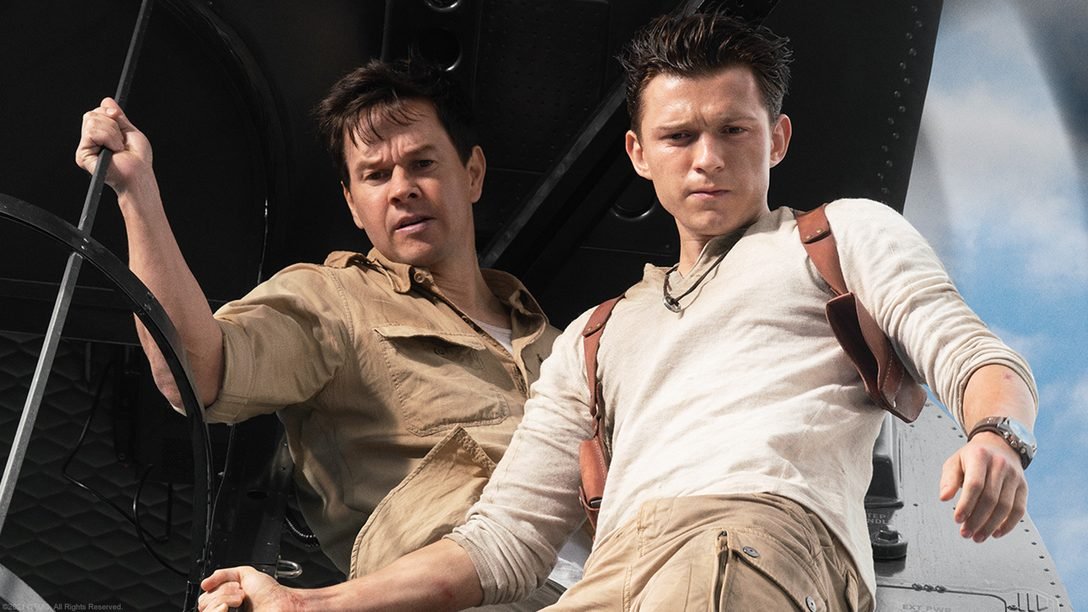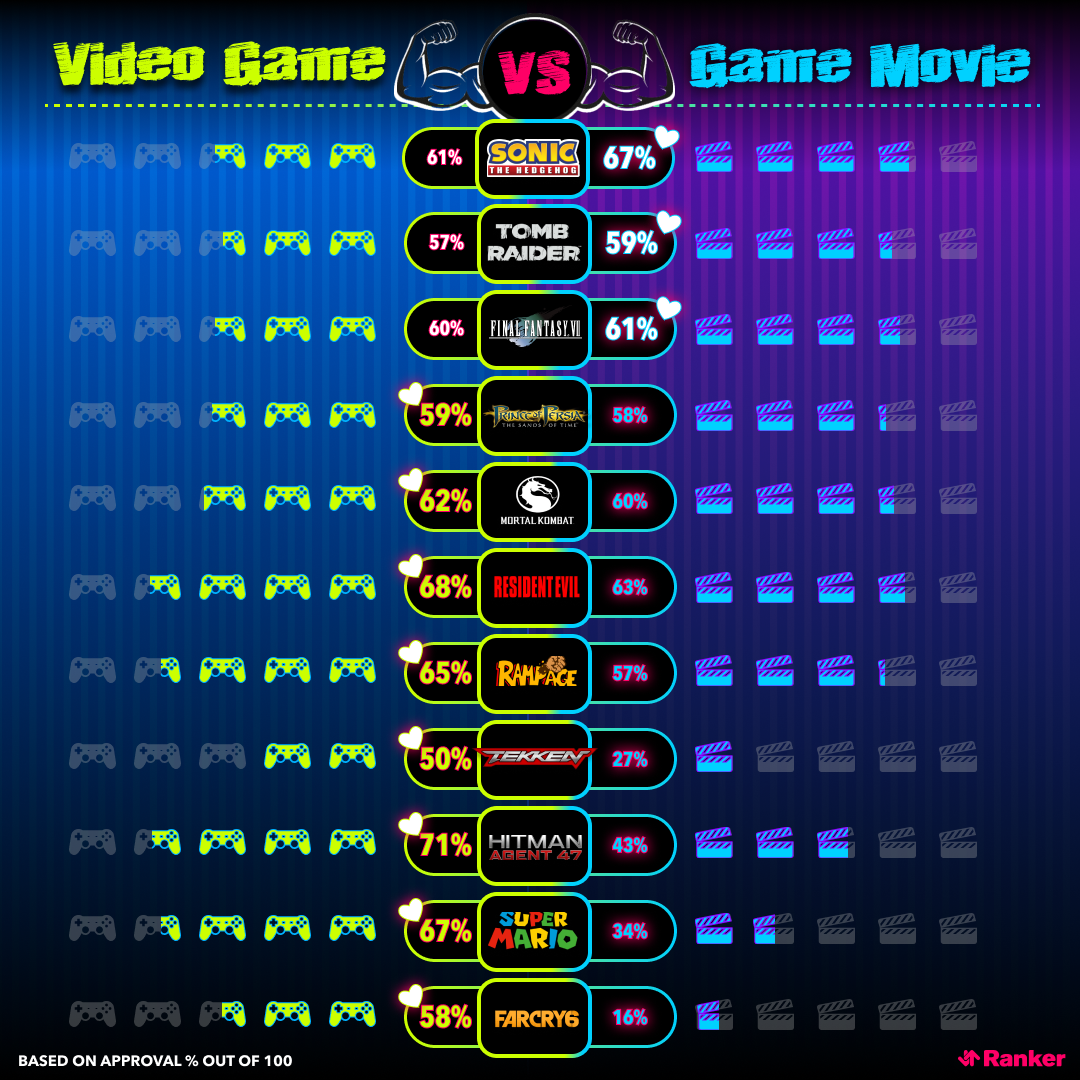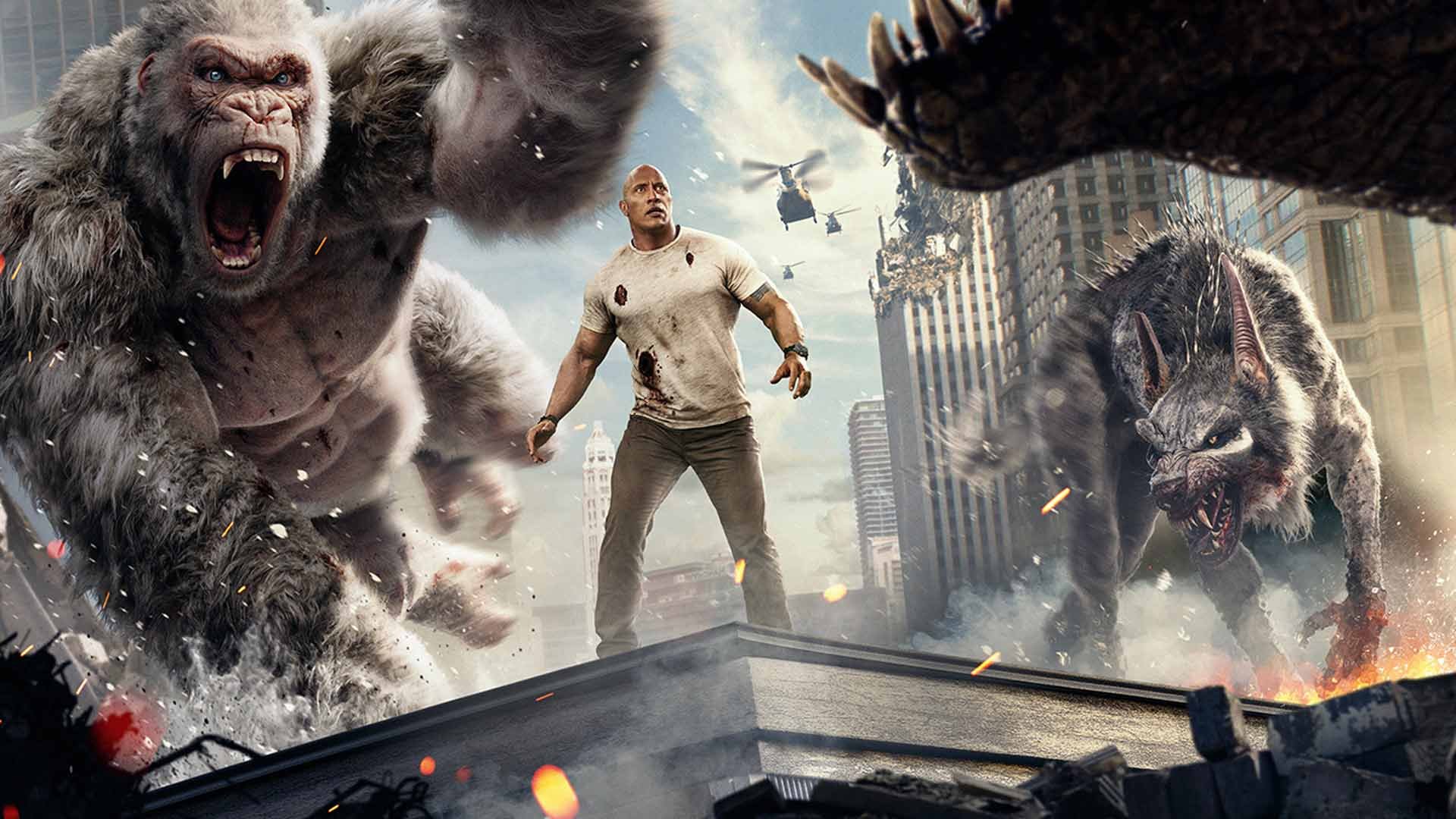Gaming Hollywood
Our data shows that some adaptations are even more popular than the blockbuster video game franchises they’re based on.
Do video games make for good movies? From 1993’s Super Mario Bros. to the upcoming Uncharted film, studios have tried to capitalize on the popularity of gaming titles over the last few decades with varying degrees of success. Some of these films gross hundreds of millions worldwide while others end up flopping, but with all these adaptations, it’s difficult to gauge just how the movie stacks up against its source material. The gaming and film industries have markedly different audiences and metrics for success, which makes it very difficult to compare the reception of a video game to that of its movie adaptation in a quantitative way — that is, it’s difficult if you’re not Ranker.
Ranker voters have visited thousands of lists on both movies and video games over the years to tell us which games and adaptations they like best. First, we’re using Insights to look at some games currently being adapted into TV shows or movies and suggest methods studios might use to advertise those adaptations to fans of the original games. Then, we’re taking a look at some high-profile Hollywood takes on stories and characters from the gaming world and comparing the total ratio of positive-to-negative votes for each to the games on which they’re respectively based. The results will tell us which movies lived up to or even exceeded the standard set by their pixelated forbearers, and which ones failed to make the crossover to the big screen.
Marketing Tomorrow’s Adaptations
Studios are bullish about video game adaptations these days, as evidenced by coming releases like Sony’s Uncharted, HBO’s The Last of Us series, and a show based on the massively popular shooter Halo coming to Paramount+. Beyond big names and big budgets, what can the producers of these titles do to ensure audiences show up? They can start by targeting fans of the original games.
Photo: Paramount+, Halo
Uncharted is being produced with the help of original game developer Naughty Dog, which suggests that Sony is interested in courting the game’s fan base. Fans of the original Uncharted game are more likely to love Christopher Nolan’s Inception and Dark Knight trilogy than any other movies, according to Ranker Insights, and all these films are available through an HBO Max subscription. Targeting the streamer’s subscriber base might be a wise course of action for Sony, whose own DC films like Suicide Squad and Batman vs. Superman don’t appeal much to Uncharted fans.
HBO, on the other hand, has an easy advantage in marketing The Last of Us to fans of the game, who are 3X more likely to love the animated film Ponyo, and 2X more likely to love Princess Mononoke and The Secret World of Arrietty. All these films are from Japan’s Studio Ghibli and can be streamed on HBO Max — that means the streamer can easily target fans of the films and potentially expand the audience of its newest original series.
Finally, those who love the original Halo: Combat Evolved game have an affection for Pixar movies like Toy Story and MCU entries like Thor and The Avengers. Paramount+ can act on that by targeting subscribers to Disney+, which streams both MCU and Pixar movies. If that’s not possible, they might consider looking at the people who use their own platform to watch titles like Danny Phantom and Invader Zim, which Halo fans are also more likely to enjoy, according to Insights.
How Video Game Adaptations Have Fared in the Past
The bar graph above illustrates the respective approval ratings (measured as the percentage of the votes received for a given movie or game that are positive) of popular video games and their adaptations. At the top are adaptations that are as or more well-liked than the video games they’re based on, and at the bottom are movies that are viewed more negatively than their source material.
As you can see, it’s very difficult for a video game movie to do better than its inspiration (unsurprising, since the only games being adapted are wildly popular and profitable ones), but not impossible. Last year’s Sonic the Hedgehog not only boasts an approval rating 6% higher than that of the original Sega game, but also is one of the highest grossing game adaptations of all time. Still, the example set by Hitman: Agent 47 proves that Hollywood doesn’t have the transition from consoles to theaters down to a science nearly 20 years after the embarrassment of Super Mario Bros. Let’s take a closer look to see if the data can tell us where each of these films went wrong or right.
Better on the Big Screen
Photo: Sonic the Hedgehog, Paramount Pictures
Sonic the Hedgehog (2020) — 67% approval
Final Fantasy VII: Advent Children (2005) — 61% approval
These two movies both managed to top their platform counterparts by opposite means. At this point, Sonic the character is far more popular than Sonic the video game — while games featuring the iconic blue hedgehog are still being released, the franchise isn’t nearly as significant as it was when the game was first released in 1991. By reaching beyond the game’s fan base with the help of stars Jim Carrey and James Marsden, the movie was able to top the popularity of its 30-year-old inspiration.
By contrast, Final Fantasy VII: Advent Children is directed specifically at fans of the gaming series: it was created by Final Fantasy studio Square Enix, looks like one long cutscene, and critics claimed the film was “utterly impenetrable” for anyone unfamiliar with the game. But today the movie is fairly unknown to those outside the Final Fantasy fan base, and within that narrow audience it’s a modest success.
Matched Expectations
Photo: Rampage, Warner Bros.
Prince of Persia (2010) — 58% approval
Resident Evil (2002) — 63% approval
Rampage (2018) — 57% approval
A good deal of the adaptations we looked at came fairly close to the approval rating of their respective classic video games. The key for success here? A-list stars, huge budgets, and a readiness to put thrilling audiences over impressing critics.
Twelve years after its release, the Jake Gyllenhaal-led Prince of Persia has been buried in the sands of time, but for years it held the record for highest-grossing video game adaptation of all time — today it’s ranked #11 on our list of the Best Movies Of 2010 (10K votes). The original Resident Evil was released at the height of star Milla Jovovich’s career, and despite middling reviews, it was the start of a six-film franchise that grossed a total of $1.2 billion and is ranked #12 on The Best Zombie Movies Of All Time (129K votes). Rampage took the concept from an old cabinet arcade game, added Dwayne Johnson, and ended up with a profitable, big-budget B movie — fittingly, the movie is #9 on Ranker’s list of Bad Video Game Movies That Are Actually Good.
All these movies, along with Sonic, play fast and loose with their source material, borrowing characters and set pieces from their video games rather than offering dedicated retellings of their stories. The lesson here: successful adaptations keep a wider, non-gaming audience in mind, relying on big stars and eye-popping special effects rather than gamer fan service. The plots don’t have to be all that sophisticated to get approval from moviegoers — but as we’ll see, there’s a limit to what audiences will put up with in terms of weak storytelling and uninspired acting.
Forgettable Flops
Photo: Super Mario Bros., Walt Disney Studio Motion Pictures
Tekken (2009) — 27%
Super Mario Bros. (1993) — 34%
Far Cry (2008) — 16%
Where did these adaptations go wrong? In the case of both Far Cry and Tekken, they produced similarly loose interpretations of their source material, but didn’t secure the kind of star power that endeared fans to other movies on this list. Directed by Uwe Boll, Far Cry put a familiar face in the lead role, but not a familiar name: German character actor Til Schweiger did his best as journalist Jack Carver, but it wasn’t enough to lift the uninspired script. Meanwhile, Tekken featured almost no one movie audiences would recognize, failing to draw audiences and earning rebuke from the original game’s designer Katsuhiro Harada.
On the other hand, Hollywood’s original sin when it comes to video game adaptations: Super Mario Bros. Starring Bob Hoskins, John Leguizamo, and Dennis Hopper, the movie took a bizarrely realist turn with a story about Italian plumbers who must rescue a princess from a giant lizard. The production itself was apparently a disaster, with studio turmoil leading to the firing of the film’s directors before principal photography was finished. Though some today argue it’s a misunderstood classic, even the film’s star Bob Hoskins claimed it was the “worst thing I ever did.” It’s no wonder this movie ranks #2 on our list of The Worst Video Game Movies Ever (23K votes).
If at First You Don’t Succeed…
Photo: Tomb Raider, Warner Bros.
Tomb Raider (2018) — 59%
Mortal Kombat (2021) — 60%
Hitman: Agent 47 (2015) — 43%









